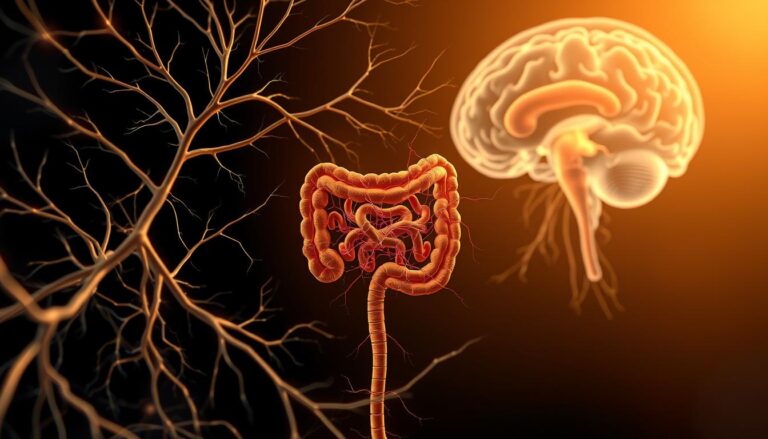Are you noticing your hair thinning? I’ll fill you in on why it’s happening how to grow it back and ways to prevent it. Losing hair can happen on your scalp or all over, and you might not keep all of it.
The reasons vary, from family genes to changes in hormones. Health issues or getting older can cause it too. It’s a condition that affects people regardless of gender, but men often face it most frequently.
When it comes to losing hair, it’s not just guys who get hit. Both men and women can face baldness. This often happens as folks get older. If your close family has gone through it, there’s a chance you might too. Things like hormone shifts, medical problems, certain drugs, and how you style your hair can impact hair loss too.
Key Takeaways
- Hair loss can be temporary or permanent, and it’s more common in men.
- Hereditary factors, hormonal changes, and medical conditions are the leading causes of hair loss.
- Lifestyle factors like stress, diet, and hairstyles can also contribute to hair loss.
- Effective treatments for hair loss include medications, hair transplants, and low-level light therapy.
- Preventable hair loss can be minimized by gentle hair care, stress management, and avoiding harsh treatments.
Understanding Hair Loss
It’s normal to lose some hair every day. This happens as part of your hair’s growth cycle. For most folks, the lost hair grows back. You keep a full head of hair. But, things like illness stress, and aging can mess with this cycle.
This can mean more hair falling out than grows back. Hair loss shows up in various ways depending on its cause. It can happen suddenly or slowly. It might impact only your scalp or your entire body. Signs include thinning at the top, bald spots, and more.
Types of Hair Loss
There are many types of hair loss, each with its unique reasons and effects. This includes male and female pattern baldness, alopecia areata, and others. Knowing the type helps with the right treatment.
Common Causes of Hair Loss
Hair loss has many triggers, from our genes to various health and lifestyle issues. Genes are often to blame, causing conditions like male or female pattern baldness. But, illnesses, scalp infections, and pulling your hair out can also be causes. Even some medicines, tight hairstyles, and chemo can lead to hair loss.
Risk Factors for Hair Loss
Many things can raise your risk of losing hair. These include a family history of balding and certain health conditions.1 While some balding due to genes can’t be stopped, we can prevent other types by being kind to our hair and avoiding harm.1
Hereditary Hair Loss
The top reason for losing hair is a hereditary issue that happens as we get older. It’s called androgenic alopecia, or male and female pattern baldness.
With this type of hair loss, it slowly happens in certain ways. Men might see their hairline move back or bald spots. Women often notice their hair getting thinner on the top of their head. Unfortunately, we can’t stop this kind of hair loss.
Male Pattern Baldness
Guys usually start losing hair at their hairline or on the top of their head. This can eventually lead to significant hair loss. Research in Dermatol Ther shows that vitamins and minerals may help reduce hair loss. Studies from Clin Dermatology Rev also note that losing a lot of hair can greatly affect someone’s life.
Female Pattern Baldness
For women, it often begins with their hair on the part and the top of their head thinning out. This makes it look like their hair is not as thick. In a survey, it was found that hair loss could affect a man’s mental health. Also, research suggests that certain nutrients are important for keeping healthy hair, ranging from 663-79%.

Medical Conditions and Hair Loss
It’s normal to lose 50 to 100 hairs a day. But, losing hair too much or too fast may signal a health condition. Hair loss, or alopecia, is more common in men. One big reason for losing hair is hereditary factors. This affects both men and women.
Hormonal Changes
Hormonal shifts because of pregnancy, giving birth, menopause, or thyroid issues can cause hair to fall out for a while. For women, hair gets thinner on top of the head. Men might see their hairline go back and notice bald spots.1 Fortunately, this hair loss often gets better once the hormone issue is dealt with.
Autoimmune Disorders
Some autoimmune diseases, like alopecia areata, mistakenly target hair follicles. This leads to patches of sudden hair loss. It can happen on the scalp or in places like the nose and ears. Conditions like lupus can also cause hair loss.
Scalp Infections
Scalp problems, including ringworm, can make hair fall out in circles. It’s important to treat these conditions to keep hair growing well. A habit of pulling out hair, known as trichotillomania, can also cause spots without hair.
Some medications, supplements, and even treatments like radiation to the head might cause hair loss. If you notice a lot of hair falling or getting thinner, see a doctor. By dealing with the health issue causing the hair loss, many find their hair grows back.
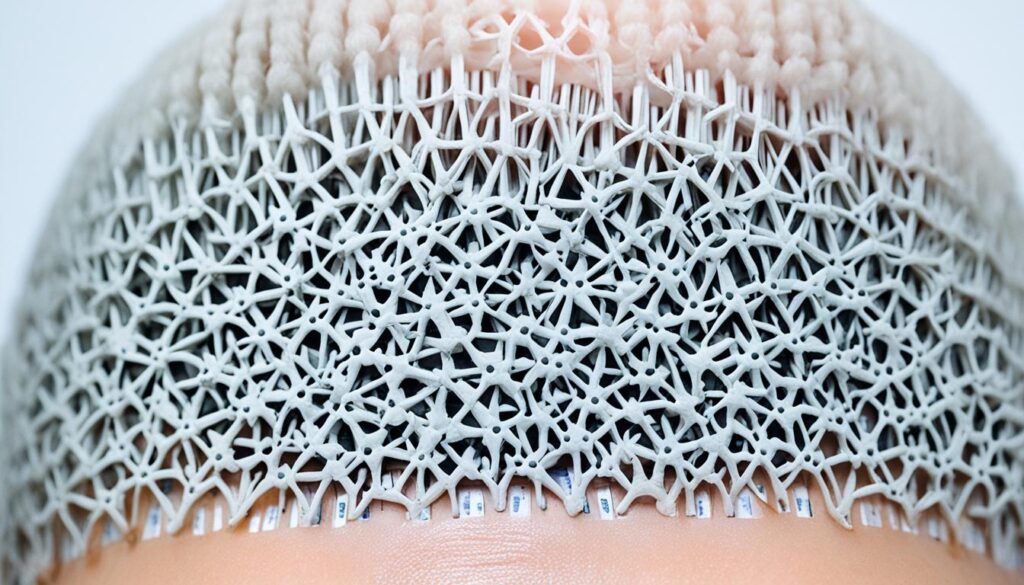
Lifestyle Factors and Hair Loss
Losing hair is already tough, but some of our habits make it worse. Doing our hair too much or wearing it tightly can cause harm. Add1 bad eating and1 smoking, and our hair may suffer.
Stress and Hair Loss
Saying stress leads to baldness isn’t just a myth. Very stressful times can make our hair thin a few months later. Good news is, this hair loss is often not for long.
Diet and Nutrition
What we eat affects our hair, too. Not getting enough key minerals like zinc, copper, and iron can lead to more hair loss. A balanced diet full of these nutrients can boost hair health and cut down on shedding.
Hairstyles and Treatments
Hairstyles that tug like pigtails and certain treatments can cause hair to fall out. This is known as traction alopecia. Perms and hot-oil treatments might do the same, leading to possible permanent loss if they leave scars.
Forget not, bad diets and1 smoking also contribute to hair loss. To keep your hair full and pretty, quit smoking, eat right, and treat your hair gently.

Hair Loss Diagnosis
If you notice your hair is falling out a lot, see a doctor. They can check your hair loss through a physical examination and blood tests. This helps find out why your hair is getting thin. Early treatment is key to stop more severe hair loss, like frontal fibrosing alopecia, in women. It can prevent permanent baldness.
Physical Examination
At the check-up, the doctor might do a pull test. They gently pull about 40 hairs to see if six or more fall out. This shows if you have hair loss. They might also use a special tool, like the Folliscope at NYU Langone, to look up close at your scalp and hair. It can magnify images up to 100 times. This helps the doctor study your hair closely.
Blood Tests
Doctors often suggest blood tests to see what’s causing hair loss. They might check for ferritin, a protein that stores iron, especially in women who have heavy periods, anemia, or are vegetarians. Low iron can make you shed hair.
They also check for thyroid issues by measuring your TSH levels. Both hyperthyroidism and hypothyroidism can make your hair fall out. For women with thin hair but no bald spots, doctors might test for high androgen levels.6
Scalp Biopsy
Sometimes, a scalp biopsy is needed to look deeper. It helps find out if an infection or other condition is the reason for your hair loss. This test takes a tiny piece of your scalp to study under a microscope. It’s a simple and quick way to get more information.
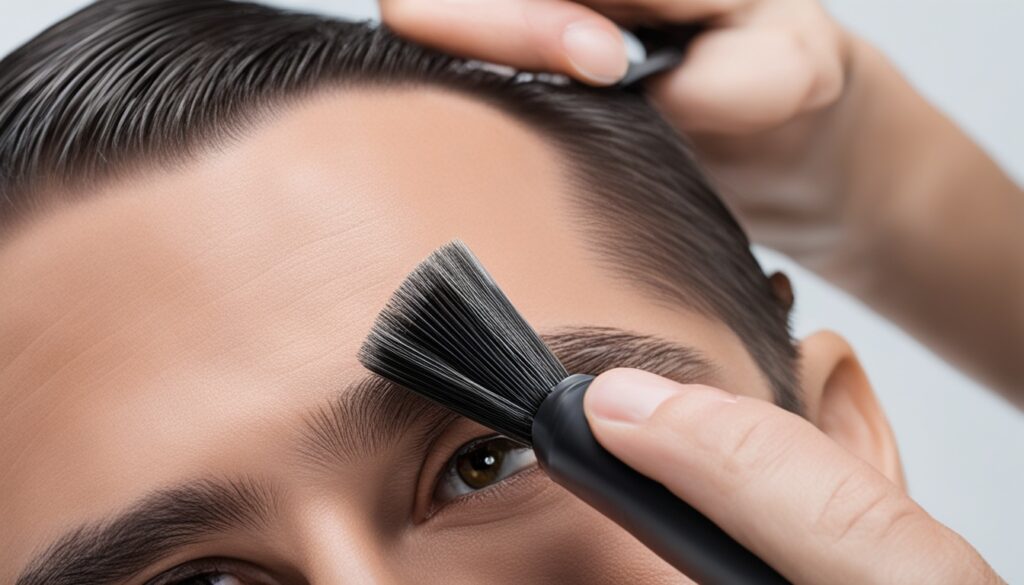
Treating Hair Loss
Dealing with hair loss is complex and varies for everyone. I’ll share the top treatments to help win back your full hair. We’ll cover both classic drugs and new, innovative solutions in hair growth.
Medications
To slow hair loss and boost new strands, try meds like minoxidil and finasteride first. Minoxidil Rogaine is an FDA backed, non-prescription product that aids hair regrowth in some. It usually takes about six months for results to show. Yet, it might cause scalp irritation and extra hair growth on skin nearby.
Finasteride Propecia is another choice for tackling male hair loss, approved by the FDA. It may help some men slow hair loss, but side effects can include a drop in sex drive and a higher prostate cancer risk. Known results on its success rate are not available, underlining the need for awareness around its potential effects.
Hair Transplant Surgery
Searching for a long-lasting fix? Consider hair transplant surgery. This method moves hair from thicker to thinner spots, aiming for a fuller look. It tends to look natural and is lasting but might need multiple sessions. Normally, you pay out-of-pocket as it’s rarely covered by insurance.
Low Level Light Therapy
Low-level light therapy LLLT is a new, gentle approach for hair regrowth. It uses light to wake up hair roots and support new growth. One type of light device has FDA clearance for use on inherited hair loss. Yet, we need more research to confirm its longer-term efficiency.
Don’t face hair loss alone. Talk to your doctor about treatment options that suit you best. With a solid plan, you can strengthen your hair and feel better about yourself.
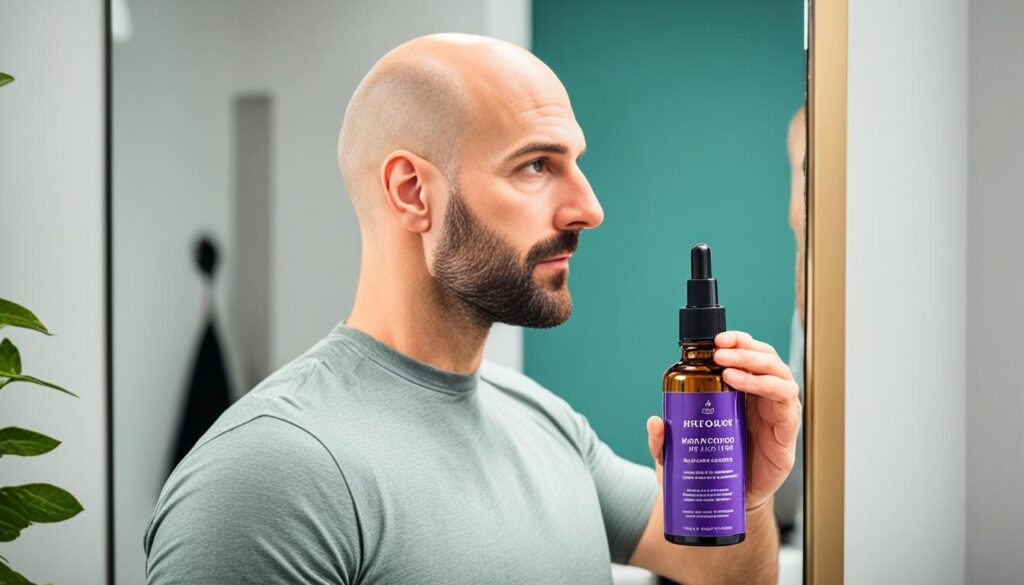
Hair Loss Prevention
Most baldness linked to genetics can’t be stopped. However you can prevent other kinds of hair loss. Treat your hair gently and avoid tough treatments. Shield your hair from the sun and quit smoking. Also talk to your doctor about any meds or supplements that could cause hair loss. Living healthily, being kind to your hair, and keeping stress in check also help against hair loss.
Healthy Lifestyle Habits
Eating right is key for strong, healthy hair.The Mediterranean diet, often tied to less male hair loss, might be a good choice.And, staying at a good weight can prevent certain types of hair loss too.
Gentle Hair Care
Treating your hair lightly is a must to avoid losing more. Stop doing tight hairstyles and using hot oils. These can harm your hair and cause it to fall out. Using hair products that boost volume and picking suitable hairdos can also help deal with hair loss.
Stress Management
Less stress means less chance of losing hair. Big stresses can lead to temporary hair loss. Too much stress can worsen lasting hair loss issues. Keeping calm with meditation, regular exercise, and mindfulness can protect your hair from stress damage.
Although you can’t change genetic causes of hair loss, healthy habits, care for your hair, and stress management can really make a difference in hair health.
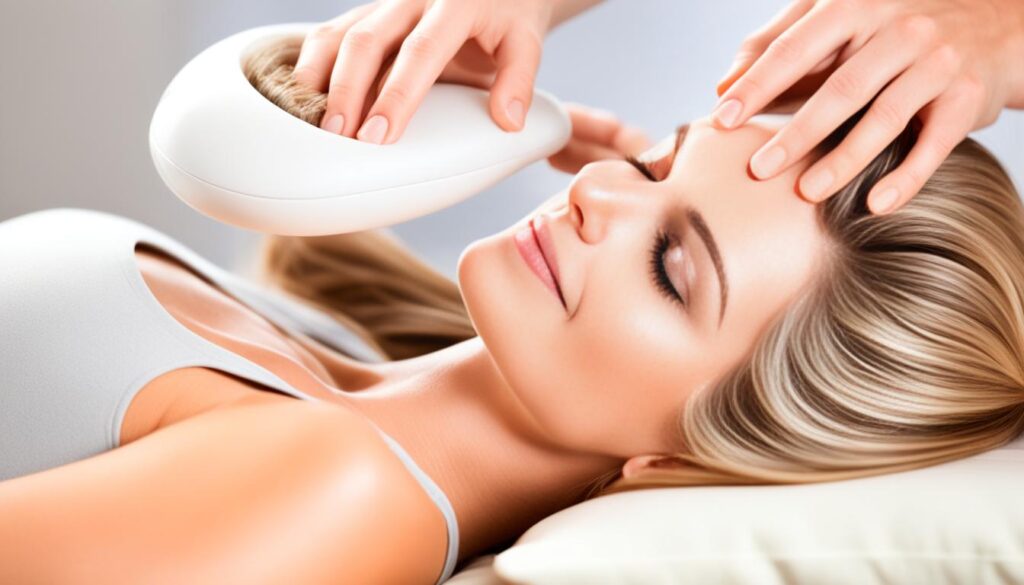
Hair Loss and Emotional Well-being
Losing hair, either suddenly or gradually, affects emotional well-being and self-esteem. It’s a common issue for both men and women. Studies show that hair thinning or loss can really hit someone hard emotionally.
In women, hair loss can stress them out more than men. This stress can lead to problems at home or with their careers. And, surprisingly, a good number of people who seek cosmetic surgery have mental health issues.
But it’s not only women who are affected. Conditions like alopecia areata and trichotillomania hit hard. They can cause sudden hair loss or make someone pull out their own hair. This can badly affect the patient and their family.
Some disorders, like body dysmorphic disorder, are linked to hair loss. BDD often shows up during the teenage years. It makes people overly worried about how they look. They might even avoid seeing friends or feel very sad.
Hair loss, be it temporary or permanent, really takes a toll on mental health. Yet, there is help out there. By talking to loved ones, joining online groups, or seeing a professional, it gets easier to deal with. These steps can help keep a positive mind and protect self-esteem through tough times.
Support and Resources for Hair Loss
Dealing with hair loss is tough, but remember, you’re not alone. Many resources are out there to help. They offer support, information, and a sense of belonging for those facing hair loss issues.11
Online Communities
Online forums and social media groups can offer great support and advice. They let you connect with others going through similar things. You can share stories and get emotional help.
The Women’s Hair Loss Project is a key community that’s been supporting people for more than ten years. Also the Children’s Alopecia Project supports kids with Alopecia.
Support Groups
There are also many in-person and virtual support groups. They provide a safe space to talk, get advice and make friends who understand.The National Alopecia Areata Foundation sponsors research to better understand this condition. Other groups, like Cancer Hair Care and Look Good Feel Better hold regular workshops on hair and scalp care.
These groups and resources are golden for anyone living with hair loss. They offer both emotional and practical help. Whether your hair loss is from health conditions, cancer treatments, or other reasons, they can offer the support you need. By connecting with others who are going through the same, you can find encouragement and useful information. This can help you deal with hair loss while staying positive.
Hair Loss Myths and Facts
Dealing with hair loss often means finding the truth among many stories. From my own experience, I know it’s hard to tell what’s real. So, let’s clear up some of the biggest myths about hair loss. We’ll also cover the key facts to understand and deal with it better.
Did you think wearing hats leads to losing hair? Not true. Plus, cutting your hair doesn’t make it thicker. Washing your hair often or not won’t change how it grows either.
Some say greasy hair makes you lose more. But, while too much oil can make your hair look thinner, it doesn’t make you lose more hair.
| Hair Loss Myth | Fact |
|---|---|
| Hair grows faster if you cut it | False |
| Greasy hair falls out more often | True |
| We lose more hair in the fall | True and False |
| Anxiety and stress can affect hair loss | True |
| Washing hair daily makes it fall out more | False |
| Brushing wet hair means more hair loss | False |
| Drinking and smoking cause hair loss | True |
| Hats and hair products cause baldness | True and False |
If you’re stressed or go through trauma, your hair might fall out for a while. But this isn’t the same as the hair loss from male pattern baldness. Drinking, smoking, and some hair treatments can hurt your hair, but they don’t always cause baldness.
A persistent myth is that only your mother’s family affects your hair loss. In truth, hair loss can come from either parent. And, the start of male pattern baldness doesn’t depend on testosterone as much as people think.
Knowing the truth about hair loss helps us make better choices for our hair. There are many ways to address hair loss, including medicines like Finasteride and hair transplants. The big lesson here is to not believe everything you hear about hair loss. Always get advice from experts.
Conclusion
Hair loss is complex and can be very distressing. It’s caused by a mix of things like genetics health issues, and how you style your hair.The good news is there are treatments and steps you can take.
These can help slow down or even stop hair loss. By learning about hair loss you can protect your hair keep it healthy and deal with any problems. Also you’re not alone there is help and support just a click away.
This article lays out everything you need to know about hair loss. From its causes to the treatments and the latest in medical care, it’s all here. If you are going through hair loss, this information is power. It empowers you to handle it and find the best solutions.
So don’t be down because of hair loss. Use the help and treatments out there. They can help you feel better about yourself and your hair.The path might be tough but the right attitude and choices will help you beat this challenge. Good luck on your journey to understanding hair loss and finding ways to stop it. Here’s to a future with great, healthy hair and a strong self confidence.
FAQ
What are the different types of hair loss?
What are the common causes of hair loss?
What are the risk factors for hair loss?
What is male pattern baldness and female pattern baldness?
Can medical conditions cause hair loss?
How does lifestyle impact hair loss?
How is hair loss diagnosed?
What are the treatment options for hair loss?
Can hair loss be prevented?
How can hair loss impact emotional well-being?
What resources are available for those dealing with hair loss?
What are some common myths about hair loss?
Source Links
- https://www.mayoclinic.org/diseases-conditions/hair-loss/symptoms-causes/syc-20372926
- https://www.webmd.com/skin-problems-and-treatments/hair-loss/understanding-hair-loss-basics
- https://www.ncbi.nlm.nih.gov/pmc/articles/PMC9710406/
- https://www.aad.org/public/diseases/hair-loss/causes/18-causes
- https://www.ncbi.nlm.nih.gov/pmc/articles/PMC9650738/
- https://nyulangone.org/conditions/hair-loss/diagnosis
- https://www.mayoclinic.org/diseases-conditions/hair-loss/diagnosis-treatment/drc-20372932
- https://my.clevelandclinic.org/health/treatments/8307-hair-loss-treatments
- https://www.medicalnewstoday.com/articles/how-to-stop-hair-loss
- https://www.ncbi.nlm.nih.gov/pmc/articles/PMC8719979/
- https://www.americanhairloss.org/resources/hair-loss-organizations/
- https://www.macmillan.org.uk/cancer-information-and-support/impacts-of-cancer/hair-loss
- https://www.isdin.com/en-US/blog/beauty/8-myths-and-truths-about-hair-loss/
- https://nashvillehairdoctor.com/hair-loss/myths/
- https://www.aafp.org/pubs/afp/issues/2017/0915/p371.html
- https://www.medicalnewstoday.com/articles/hair-loss-the-latest-science-on-causes-treatment-and-prevention

